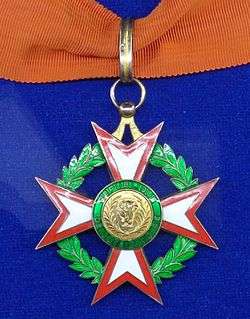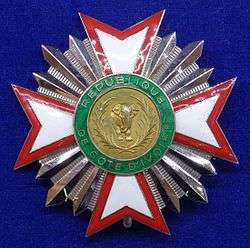National Order of the Ivory Coast
The National Order of the Ivory Coast (sometimes simply mentioned as National Order) is the highest state order of knighthood of the Ivory Coast.
| National Order of the Ivory Coast Ordre National de la Côte d'Ivoire | |
|---|---|
 Grand Officer's badge | |
| Awarded by | |
| Type | State Order |
| Established | 10 April 1961 |
| Awarded for | Meritorious service to the state. |
| Classes |
|
| Precedence | |
| Next (higher) | None |
| Next (lower) | Order of Ivory Merit |
Ribbon bar of the order | |

History
The Order was founded on 10 April 1961 to celebrate the independence of the Ivory Coast which was until 1960 a French colony. As the highest state honour, it is awarded to those who have highly distinguished themselves to the service to the state.[1] The collar Collar is awarded solely to foreign heads of state.
Insignia
The medal of the order is constituted of a white-enamelled cross of Malta, bordered in red, surrounded by a green crown of laurel. At the centre of the cross in a gold medallion showing a frontal elephant surrounded by a crown of laurel, the whole surrounded by a green-enamelled ring with golden inscription "REPUBLIQUE DE COTE D'IVOIRE" ("Republic of Ivory Coast").
The plaque shows the same design as the medal but the cross is put upon a silver radiating star.
The ribbon of the order is dark orange.
Grades
The Order is subdivided in five ordinary grades, plus a special class of the Collar:






References
- Salhi, Kamal, ed. (2000). Francophone Studies: Discourse and Identity. Exeter, UK: Elm Bank Publications. p. 54. ISBN 1902454057.
External links
- World Medals Index, Ivory Coast: National Order